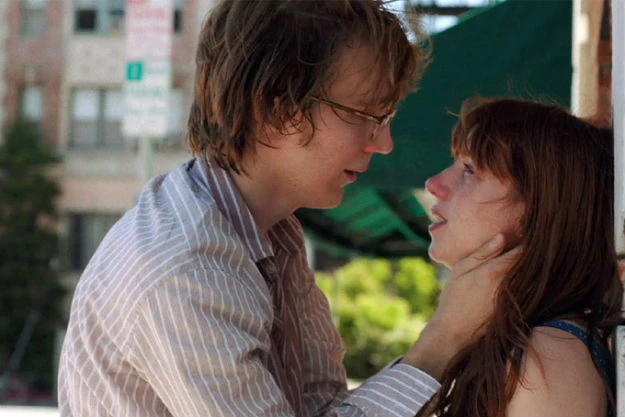Here's my choice for the summer's perfect date movie. The review previously appeared in ICON and is reprinted with permission.
********
Like Little Miss Sunshine, Ruby Sparks, Jonathan
Dayton and Valerie Faris' long awaited follow-up to their 2006 critical and
commercial hit, infuses a bouncy, inherently madcap idea with human frailty. Ruby
Sparks lacks the unbridled everyman appeal of Little Miss Sunshine—some
may find their follow-up too hip—but it's a welcome tweak to the filmmakers'
early formula, one where intelligence and entertainment happily coexist.
Calvin Weir-Fields (Paul Dano) is a young novelist whose
career has stalled since he became a literary sensation at age 19. More great
things were expected. Ten years later, the world, including Calvin's publisher,
waits. Inspiration has not arrived even though the writer sequesters himself with
a typewriter in an oppressively white, minimalist home. A woman may help. The
two people Calvin sees regularly, his macho brother, Harry (Chris Messina), and
his tolerant therapist (Elliott Gould), suggest as much. The latter offers an
approach Calvin can appreciate. Calvin bought a dog as a way to meet people, so
the therapist asks him to write about how someone else sees the pet.
The exercise works exceptionally well. Calvin dreams of a
girl—who previously appeared as a sun-drenched silhouette—approaching him and
his dog. A conversation ensues. Details emerge. When Calvin awakens, he starts
writing about this bedtime woman—her life, her passions, everything. He even
gives her a name: Ruby Sparks. The pages pile higher, and Calvin can't tear
himself away. It's a masterpiece. Harry isn't so sure. "Where is this
going?" he asks after reading the draft. We find out the next morning,
when a stunned Calvin finds Ruby making eggs in the kitchen. After a trip
outside to confirm that the tights-wearing ingénue (Zoe Kazan, Dano's real-life
girlfriend) is indeed real, the young man is blissful. In creating his dream
girl, he has solved two problems. And the best part is, Calvin can control her.
Type a line and Ruby can be happy, sad, or speak fluent French.
Harry's question turns out to be oddly prophetic. Written by
the 28-year-old Kazan, already a veteran playwright, Ruby Sparks doesn't
look at the relationship dynamics between reality and fantasy. And with the
exception of Calvin's frantic search for confirmation of Ruby's existence, the
movie isn't particularly zany. Ruby Sparks spends its time dissecting
the myth that finding the perfect mate solves every problem. Calvin is lonely,
and with good reason: He is a moody, petulant brat who wants the relationship
on his terms. After months together, Calvin finally introduces Ruby to his
mother (Annette Bening) and lover (Antonio Banderas), a warm couple whose
crunchy, free-spirited lifestyle the preppy and reserved Calvin abhors. Ruby
loves the laughter and camaraderie. He spends time alone with a book, a world
he can control.
Predictably, Ruby and Calvin's relationship grows static.
Instead of taking a good, long look at himself Calvin unearths his manuscript
and edits Ruby down to size. Kazan and the directors never lose sight that
hyperbole is at the heart of all this. When Ruby has the gall to ask Calvin to
spend one night a week at her place, his keystrokes turn the girl into a needy
mess ("I miss you right now!"). Making her happy sounds easy in theory
until she has the disposition of a morning show host on uppers. These moves
don't feel cheap or easy because the film doesn't cram itself into a genre. Its
energy comes from Kazan, Dayton, and Faris' refusal to indulge our
expectations. You anticipate an outside threat: a hunky competitor or an angry
and incredulous rival. None emerge. Calvin's oblivious fidelity to his sterile,
bland world is the threat, and poor Ruby can't understand why she has to live
there.
Kazan recently said that she didn't write the script, based
on the Pygmalion myth, for an acting gig. I believe her. Ruby is a reflection
of Calvin's issues more than a star-making performance, which makes me a bigger
fan of Kazan (The Exploding Girl, Me and Orson Welles). She cares
about the integrity of the film more than establishing a brand. Regardless, her
performance reminds you of the smart, sexy girl in English lit—the one who
loved bands and movies you never heard of—whom you never had the balls to
approach. Dano's work is more important. He grows more obnoxious as Ruby grows
tired of every writer's life cliché. But we never lose our patience with him.
The guy is just clueless. Calvin must learn that you have to love yourself
before you love someone else. Ruby Sparks' creativity and ingenuity makes
it entertaining; that it's a magical reality check makes the film meaningful.
[R]


No comments:
Post a Comment